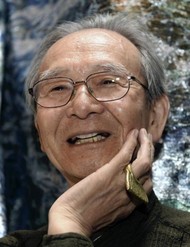JUNICHI ARAI, NUNO & REIKO SUDO

Junichi Arai
Junichi Arai was born in Kiryu, the center of traditional Japanese silk weaving, and was trained in his family’s mill. He went on to become one of the most innovative textile artists of our time. Over the past fifty years he has won dozens of patents for his work in fiber chemistry, metallic fibers and finishes, and other surface treatments, including a unique melt-off process for creating metallic textiles. Incorporating traditional Japanese hand weaving and dyeing techniques with cutting-edge technology, he is famous for complexity and innovation. In the 1970’s he began creating specialized fabrics for Japanese fashion designers such as Issey Miyake and Rei Kawakubo (Comme des Garcons).
He founded Nuno in 1984.
Nuno
Nuno is the Japanese word for ‘cloth’ or ‘fabric.’
Junichi Arai started NUNO in 1984 and in 1987 Reiko Sudo took over as design director. She has continued to push boundaries with contemporary textiles. Reiko is involved in many projects creating small runs of textiles in collaboration with mills and factories in Japan in an effort to keep alive the strong textile skills and traditions in the country and make them available around the world.
Nuno textiles are at the forefront of contemporary textile design. They represent a convergence of centuries-old traditions with advanced technologies ultimately transforming how we think about textiles today. Materials such as feathers, nails, paper and copper become key components in their textile making.
Nuno contemporary textiles are timeless and durable.
Reiko Sudo
Born in 1953 in Ibaragi, Japan, Reiko Sudo is a contemporary textile designer renowned for ‘permanent pleating’ and for combining unlikely materials with weaving and textile production. She has been Nuno’s design director since 1987. Her current work exhibits internationally.
Reido Sudo studied painting before focusing on textile design and hand weaving at Musashino Art University, Tokyo (1975), where she also taught. Her inspiring experimental textiles have been exhibited worldwide and feature in many museum collections.
Junichi Arai was born in Kiryu, the center of traditional Japanese silk weaving, and was trained in his family’s mill. He went on to become one of the most innovative textile artists of our time. Over the past fifty years he has won dozens of patents for his work in fiber chemistry, metallic fibers and finishes, and other surface treatments, including a unique melt-off process for creating metallic textiles. Incorporating traditional Japanese hand weaving and dyeing techniques with cutting-edge technology, he is famous for complexity and innovation. In the 1970’s he began creating specialized fabrics for Japanese fashion designers such as Issey Miyake and Rei Kawakubo (Comme des Garcons).
He founded Nuno in 1984.
Nuno
Nuno is the Japanese word for ‘cloth’ or ‘fabric.’
Junichi Arai started NUNO in 1984 and in 1987 Reiko Sudo took over as design director. She has continued to push boundaries with contemporary textiles. Reiko is involved in many projects creating small runs of textiles in collaboration with mills and factories in Japan in an effort to keep alive the strong textile skills and traditions in the country and make them available around the world.
Nuno textiles are at the forefront of contemporary textile design. They represent a convergence of centuries-old traditions with advanced technologies ultimately transforming how we think about textiles today. Materials such as feathers, nails, paper and copper become key components in their textile making.
Nuno contemporary textiles are timeless and durable.
Reiko Sudo
Born in 1953 in Ibaragi, Japan, Reiko Sudo is a contemporary textile designer renowned for ‘permanent pleating’ and for combining unlikely materials with weaving and textile production. She has been Nuno’s design director since 1987. Her current work exhibits internationally.
Reido Sudo studied painting before focusing on textile design and hand weaving at Musashino Art University, Tokyo (1975), where she also taught. Her inspiring experimental textiles have been exhibited worldwide and feature in many museum collections.

